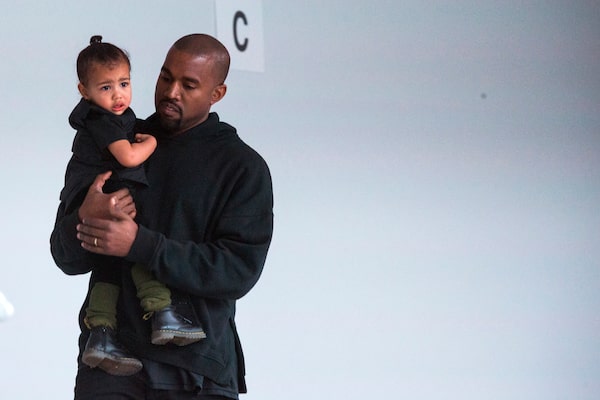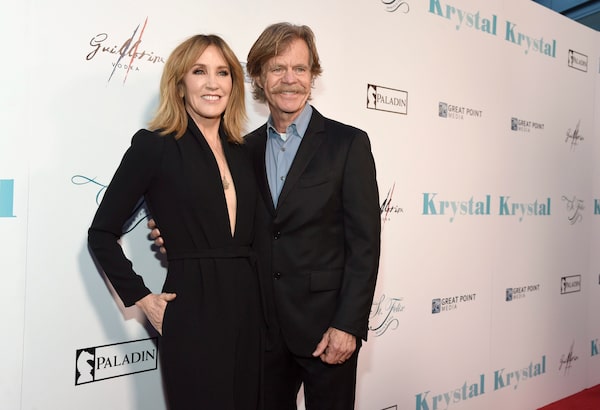
Kanye West carries his daughter, North, while preparing for a presentation of his Fall/Winter 2015 partnership with Adidas at New York Fashion Week on Feb. 12, 2015.Lucas Jackson
Kanye West closes his latest album Ye with a song written for his daughter, North West, who is four years old. Incongruously titled Violent Crimes, it is a strange gift for a child.
Released earlier this month, the song reveals West’s palpable anxiety about his daughter growing up “in a hurry.” It is a fear most parents harbour, hoping to keep their children safe and innocent for as long as possible.
But West takes parental angst to another level. Violent Crimes serves as Exhibit A for misguided ideas that linger around fatherhood and daughters.
The artist seems terrified of his child’s puberty, a decade before it’s set to arrive. He frets about the “curves under your dress,” suggesting his daughter shield herself against male attention by covering up and sticking to combative karate, not body-toning pilates. “I pray your body’s draped more like mine and not like your mommy’s,” West raps, referring to his hypersexualized wife, Kim Kardashian.
West wants to control female sexuality in his family – even as he’s voyeuristically fixated on it. The song has made female critics queasy. “Of the many ‘father guarding their daughter’s virtue’ ballads I have heard in my life, Violent Crimes is unquestionably the most uncomfortable listen,” Meaghan Garvey wrote in her less-than laudatory review for Pitchfork. The Atlantic’s Hannah Giorgis pointed out the “indelicacy of discussing a child’s future sex life.”
If a man is known by the company he keeps, then look no further than West’s friendship with U.S. President Donald Trump, who provokes a collective gag reflex when he speaks about his daughter Ivanka, whether he’s complimenting her figure or musing about dating her, if only he wasn’t Dad.
Trump’s parenting style is on a whole other plane of disturbing. With dads like West, paternalistic attitudes mean some fathers still see themselves as the gatekeepers of their daughters’ sexual lives. It’s unhealthy masculinity bleeding into fatherhood, said Ian DeGeer, a researcher involved in a 2014 White Ribbon study called Give Love, Get Love: Involved Fathers and Gender Equity.
“There’s a lot of socialization that men should fear other men. We know about the locker-room talk, about what happens when guys get together. For some dads, what happens is they think, ‘No guy is ever going to be good enough.’ They revert to the tough-guy stand: ‘If you want to try it, I’m the top dog,’” said DeGeer, who has twin seven-year-old daughters.
On Violent Crimes, West shares his conviction that men are chauvinist pigs until they have daughters, at which point they reform and see women as human beings. He raps about men being “monsters” and “players” until they have their own little girls: “Now I see women as something to nurture, not something to conquer.”
It’s a sentiment that’s as insulting to women as it is to men. There’s vast narcissism involved, too. It’s not just any baby girl who convinces West that women are people, too, but specifically the daughter he’s conceived. West’s lyrics call to mind a phrase often used to summon compassion for victims of sexual violence: “Imagine if it was your daughter, your sister, your mother.” It’s a well-meaning but irksome expression that implies men can’t stir up empathy for women who are harmed unless they’re biologically related to them.
After #MeToo, it’s clear the daddy-daughter relationship needs some work. Leading the charge is actor William H. Macy, who described his evolving thinking about his daughters Sophia, 17, and Georgia, 16, and their dating lives last month.

Felicity Huffman, left, and William H. Macy arrive at the Los Angeles premiere of "Krystal" at ArcLight Hollywood.Chris Pizzello
“You know, I started doing all the clichés, ‘I’m gonna threaten the guys, I’m gonna dig a moat around our house,’” Macy told Us Weekly.
“And then I thought, ‘Okay, what do you really want for your daughters?’ And I realized, I want them to be happy and lusty and safe. I want them to have a lot of sex in their lifetime. Good, healthy wonderful sex with no guilt.”
While some observers were put off by Macy’s use of the word “lusty” in proximity to his teenage daughters, others knighted Macy “woke dad.” His was a radical statement, something we’ve not really heard before.
Brian Russell, a Toronto father with three daughters ages 18 to 21, says real-world dads should engage their daughters between the two extremes voiced by Macy and West.
“If dads come across as, ‘Here’s the line. Don’t cross it, or else,’ they’re going to lose their daughter. If they don’t have conversations, or some level of expectation around how to make good choices, they’re also going to lose their daughter,” said Russell, a marriage and family therapist and the Ontario provincial co-ordinator for Dad Central, an organization that promotes involved fatherhood.
At home, Russell and his wife stress this with their daughters: their beauty, value and identities are not rooted in their looks or in sex. Through his own marriage, Russell tries to model “this idea in my daughters’ minds of what to expect from men.”
Instead of being petrified by their daughters’ inevitable dating years, instead of mortifying them with talk of roughing up guys who show up at the front door, fathers such as West should invest more energy into the everyday of their daughters’ lives. When it’s time, the conversation ought to focus on what good relationships look like, not ridiculous karate chops and modest robes.
Beyond daughters, perhaps West should also devote an aspirational song to Saint West, his son.
 Zosia Bielski
Zosia Bielski